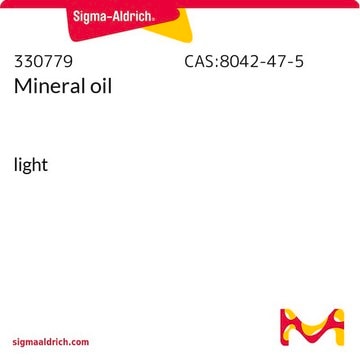132047
1,2,4-Trichlorobenzene
ReagentPlus®, ≥99%
About This Item
Productos recomendados
vapor density
>6 (vs air)
Quality Level
vapor pressure
1 mmHg ( 40 °C)
product line
ReagentPlus®
assay
≥99%
form
solid or liquid
autoignition temp.
1060 °F
expl. lim.
6.6 %, 150 °F
refractive index
n20/D 1.571 (lit.)
bp
214 °C (lit.)
mp
16 °C (lit.)
solubility
water: insoluble
density
1.454 g/mL at 25 °C (lit.)
SMILES string
Clc1ccc(Cl)c(Cl)c1
InChI
1S/C6H3Cl3/c7-4-1-2-5(8)6(9)3-4/h1-3H
InChI key
PBKONEOXTCPAFI-UHFFFAOYSA-N
¿Está buscando productos similares? Visita Guía de comparación de productos
Categorías relacionadas
General description
Application
1,2,4-Trichlorobenzene may be used as a solvent in the synthesis of indene-C60 bis adduct, which can find applications in high performance solar cells. It can also be used as a carrier gas in the textile industry.
Legal Information
signalword
Warning
hcodes
Hazard Classifications
Acute Tox. 4 Oral - Aquatic Acute 1 - Aquatic Chronic 1 - Skin Irrit. 2
Storage Class
6.1C - Combustible acute toxic Cat.3 / toxic compounds or compounds which causing chronic effects
wgk_germany
WGK 3
flash_point_f
235.4 °F - closed cup
flash_point_c
113.0 °C - closed cup
Certificados de análisis (COA)
Busque Certificados de análisis (COA) introduciendo el número de lote del producto. Los números de lote se encuentran en la etiqueta del producto después de las palabras «Lot» o «Batch»
¿Ya tiene este producto?
Encuentre la documentación para los productos que ha comprado recientemente en la Biblioteca de documentos.
Los clientes también vieron
Nuestro equipo de científicos tiene experiencia en todas las áreas de investigación: Ciencias de la vida, Ciencia de los materiales, Síntesis química, Cromatografía, Analítica y muchas otras.
Póngase en contacto con el Servicio técnico









